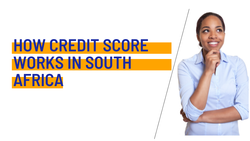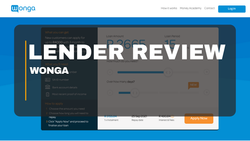The word credit score can get any person feeling anxious. Most people are aware that it impacts whether or not they are eligible for a loan or any form of credit and what type of interest rate they will receive, but they are unaware of how a credit score is calculated. Read further to understand everything you should know about how credit score works in South Africa.
What is a credit score?
A credit score is a summary of your financial behaviour that reveals how you manage your debt and how likely you are to be a credit risk. You are allowed one free credit report per year from any major credit bureau as a South African consumer. You can also challenge any inaccuracies or out-of-date details in the report.
Credit companies will do a credit check on you with a credit bureau when you apply for a loan. This is done to assess your creditworthiness and ability to repay any credit that has been extended to you. A poor credit score will limit your credit options and prevent you from achieving any financial objectives, like needing to apply for a personal loan.
Understanding how your credit score gets calculated will help you understand how lenders see you based on your credit history and financial management.
The Flair Isaac Corporation (FICO scores) system calculates a person's credit score in South Africa. Your credit score is a number between 0 and 999 and measures your ability to repay debt, with a higher score indicating better repayment ability. If your credit score is low, you'll have a hard time trying to get a loan from any retailer or bank, but a higher score will provide you with more options. You will improve your financial management, debt status, and general finances by improving your credit score.
What data is considered in a credit score
Your credit score is your credit history, which is a record of how much money you've borrowed throughout your life and how well you've repaid it. A strong credit score indicates that you have been on time in repaying your debt.
In brief, the following data is considered on your credit report:
- Financial institutions that have defaulted on you in the past due to court judgements or defaults, including blacklistings.
- How long have you been able to get credit
- How much debt do you owe, and how much available credit do you have
- How many credit applications have you made in a given period, and the types of credit you have applied for.
- Your employment history
- Your repayment history
How is credit score calculated?
The credit bureau determines your credit score based on an internal risk assessment that considers many factors. Your credit score might differ from other bureaus as the risk assessment may be calculated differently within each bureau.
The higher your credit score, the better your credit, which means you're more likely to be approved for a credit application and offered a lower interest rate on the money you borrow. It's important to note that credit providers also consider additional information on your credit, such as your debt-to-income ratio. Even if you have a good credit score, having a lot of debt can negatively impact your loan application.
If you are considering applying for a home loan or vehicle financing, or if you wish to extend your credit limit, your credit score can help you. A below-average score means you need to improve your credit score.
A low credit score could also mean that there's an issue with the data on your credit report and that you should investigate and possibly dispute some of the details in your credit report before applying for a loan.
Credit score ratings and what they mean
As previously stated, your credit score ranges from 0 to 999, indicating your financial decisions as well as the risk of future loans. Although it will vary per person, here's an idea of where you stand regarding risk and rating:
- Below 583: You're considered a high-risk person and will likely not get a loan.
- Between 584 and 613: You fall into a high-risk category and are considered a "potentially high risk."
- Between 614 and 680: You're categorised as medium risk and may find it difficult to get approved for a home loan.
- Between 681 and 766: This is a good credit rating, and you're likely to get approved for a home loan.
- 767 and higher: This is an excellent rating, and you'll get considered very low risk.
A strong credit score should be seen as a valuable asset that should be maintained. The majority of South Africans find it impossible to survive without credit. A good credit score will make it easier for you to obtain credit at a lower interest rate, saving you a lot of money in the long run.
Credit bureaus in South Africa
The four main credit bureaus in South Africa are:
- Experian
- TransUnion
- Compuscan
- XDS
Different creditors use different bureaus; some cooperate with all four, while others with just one or two. As a result, the information held by different credit bureaus about you may differ slightly.
According to the National Credit Act, everyone is entitled to a free credit report from each credit bureau once a year. It's well worth your time to take advantage of this and check with each credit bureau, as it will give you an excellent picture of your total financial status.
How much do you need?
Get a Loan up to R350,000
Representative example: Estimated repayments of a loan of r30,000 over 36 months at a maximum interest rate of 29.25% apr would be r1,381 per month including fees. Repayment terms can range from 2 - 72 months. Myloan is an online loan broker and not a lender. Our service is free, and we only work with NCR-licensed lenders in South Africa. Interest rates charged by lenders can start as low as 19.25% apr, including an initiation and service fee determined by the lender. The interest rate offered depends on the applicant's credit score and other factors at the lender's discretion.



























